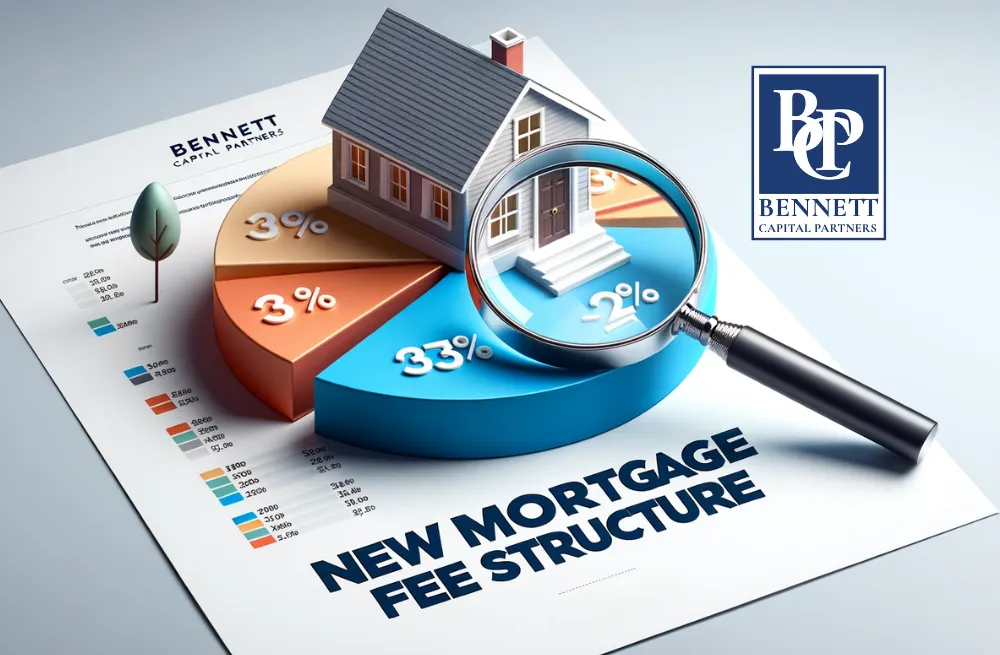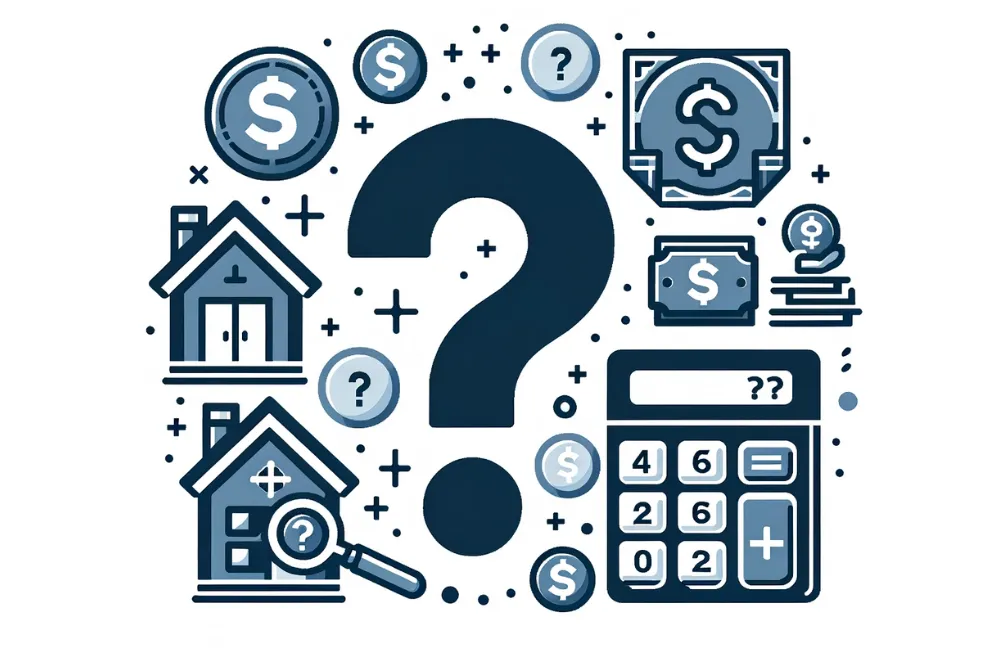Understanding The New Mortgage Fee Structure: What You Need To Know
Updated: Nov 29, 2023

Mortgage fees and charges can sometimes be a confusing aspect of home buying. If you're in the market for a mortgage, you should know that a new mortgage fee structure was implemented on May 1, 2023.
This article will delve into this change, highlighting its impacts on different types of borrowers and offering tips to navigate it effectively. Stay tuned if you want to get ahead with your financial planning in light of these changes!
Key Takeaways
✅ The new mortgage fee structure was implemented on May 1, 2023 for homebuyers.
✅ The new fee structure adjusts fees based on credit scores and down payment sizes to align with risk levels and market conditions.
✅ Buyers with strong credit scores may pay slightly less in fees under the new structure, while buyers with weaker credit scores may face higher fees.
✅ Mortgage brokers play a crucial role in helping homebuyers understand the impact of these changes and finding alternative options if needed.
Quick Navigation - Click the link below to jump to that section..
What is the New Mortgage Fee Structure?

The new mortgage fee structure refers to the changes made in the fees associated with obtaining a mortgage loan. These changes were implemented by Fannie Mae and Freddie Mac, two government-sponsored enterprises that back most of the mortgages in the United States.
The purpose of this fee change is to adjust the loan-level price adjustment (LLPA) fee, which is based on factors such as credit score and down payment, to better align with risk levels and market conditions.
Purpose of the fee change
The fee change has a reason. Fannie Mae and Freddie Mac want to even things out. They want homebuyers who have riskier loans to pay more. These homebuyers might have low credit scores or small down payments.
On the other hand, they want buyers who are less risky to pay less. These changes started on May 1, 2023. This is how it helps both the lenders and borrowers in the long run.
Definition of loan-level price adjustment fee
A loan-level price adjustment fee is a part of getting a mortgage. This fee comes from Freddie Mac and Fannie Mae, who back most loans in the US. They put this fee on lenders when they offer to make loans for home buying.
The cost of this fee can change because it links with your credit score and how much you pay down on your house at first.
Let's look more into what this means for buyers like you! With good credit (a score of 740 or up) and a down payment that is 15% or higher, you could pay around 1% as your loan-level price adjustment fee.
But if your credit is lower or less money gets put down at first, the cost goes up - sometimes even above 2%. It's done this way so people with better scores don't have to cover folks with lower ones in fees.
📞Give Us A Call Today 1-305-407-0747
Changes in the Mortgage Fee Structure

Starting on May 1, 2023, the new mortgage fee structure will have a significant impact on buyers with both strong and weaker credit scores.
Effective date (May 1, 2023)
On May 1, 2023, the new mortgage fee structure started. Both Fannie Mae and Freddie Mac are putting this in place. Your credit score and down payment size will set these new fees.
These changes mean you might have to pay more for your mortgage loan than before.
Impact on buyers with strong credit
Buyers with strong credit scores will also be affected by the new mortgage fee structure. Under the new rules, borrowers with higher credit scores will still have to pay upfront fees, although they may pay slightly less compared to buyers with lower credit scores.
For example, a buyer with a credit score of 740 and a 15% down payment would pay around 1% in fees under the new structure. While this is lower than what they would have paid before, it's important for buyers with high credit scores to factor in these additional costs when considering their overall affordability.
The changes aim to impact the overall costs for all borrowers, including those who are financially responsible and have good credit histories.
Impact on buyers with weaker credit
Buyers with weaker credit will be more affected by the new mortgage fee structure. Under the new rules, borrowers with lower credit scores may face higher fees compared to those with stronger credit.
This means that if you have a lower credit score and are looking to buy a home, you may have to pay more in upfront fees. It's important for buyers with weaker credit to understand these changes and how they can impact their overall costs when obtaining a mortgage loan.
Controversy and Criticism

Buyers with higher credit scores have expressed criticism over the new mortgage fee structure, as they feel they are being unfairly penalized for their responsible financial history.
The government has responded by stating that the changes are necessary to ensure the long-term stability of the housing market and to mitigate risk for lenders.
Criticism from buyers with higher credit scores
Buyers with higher credit scores are expressing their dissatisfaction with the new mortgage fee structure. These buyers argue that they have worked hard to maintain excellent credit and should not be penalized with higher fees.
They feel that the new fee structure unfairly targets borrowers who have demonstrated responsible financial behavior. However, the government has defended the changes, stating that they are part of an effort to address risks in the housing market and ensure a stable lending environment.
Despite this response, buyers with higher credit scores remain critical of the impact these fees will have on their ability to access affordable mortgages.
Response from the government
The government has responded to the controversy and criticism surrounding the new mortgage fee structure. The Federal Housing Finance Agency (FHFA), which oversees Fannie Mae and Freddie Mac, has stated that the changes in fees aim to balance risks and costs for borrowers.
They believe that by adjusting fees based on credit scores and down payments, they can ensure fair pricing and encourage responsible borrowing. The government's response suggests that they are taking into account different factors when implementing these changes in order to create a more equitable mortgage fee structure.
The Role of Mortgage Brokers in the New Mortgage Fee Structure

Mortgage brokers play an important role in the new mortgage fee structure. They act as intermediaries between borrowers and lenders, helping homebuyers find the best mortgage deals that suit their needs and financial situations.
Mortgage brokers have access to a wide range of lenders and can help borrowers navigate through the complexities of the mortgage process.
In the context of the new fee structure, mortgage brokers can provide valuable guidance to homebuyers regarding how the fees will impact their overall costs. They can explain how different credit scores and down payments affect the fees charged by lenders.
With their knowledge of various loan programs and eligibility requirements, mortgage brokers can help borrowers explore options that may result in lower fees or more favorable terms.
Additionally, mortgage brokers can assist buyers in understanding any changes or updates to loan-level price adjustment (LLPA) fees under the new structure. They can explain what LLPA fees are and how they are calculated based on factors like credit score and down payment size.
Overall, mortgage brokers serve as advocates for homebuyers, providing them with expert advice throughout the entire mortgage process. In relation to the new fee structure, they offer valuable support by helping borrowers understand how these changes may impact their borrowing costs and providing guidance on finding alternative options if needed.
Tips for Home Buyers

Lowering your mortgage fees is possible by understanding the importance of credit scores, FHA mortgage rates, and overall affordability. Read on to find out how you can save money on your mortgage payments.
How to lower mortgage fees
Lowering mortgage fees can help borrowers save money. Here are some tips to reduce your mortgage fees:
🎯 Improve your credit score: Lenders often charge higher fees for borrowers with lower credit scores. By improving your credit score, you may qualify for a better fee structure and lower overall costs.
🎯 Save for a larger down payment: A higher down payment can decrease the loan-to-value ratio, which may result in lower fees. Saving more money upfront can help you pay less in upfront fees.
🎯 Shop around for lenders: Different lenders may offer different fee structures and rates. Take the time to compare multiple lenders and negotiate the best terms for your mortgage.
🎯 Consider paying points: Paying points upfront can reduce your mortgage interest rate and potentially lower your overall fees. However, it's important to calculate whether the cost of paying points will outweigh the long-term benefits.
🎯 Avoid unnecessary add-ons: Some lenders may try to sell additional services or products that can increase your fees. Carefully review all added costs and consider if they are necessary or beneficial to your specific situation.
The Importance of Credit Score in Mortgage Fees
Your credit score plays a crucial role in determining the fees you'll pay for your mortgage. Under the new fee structure, borrowers with higher credit scores will generally have lower fees compared to those with lower credit scores.
This means that if you have a good credit score, you may be able to pay less in upfront fees when getting a mortgage. On the other hand, if your credit score is lower, you might face higher fees.
So it's important to work on improving your credit score before applying for a mortgage to potentially save money on fees.
Understanding FHA Mortgage Rates
FHA mortgage rates play a crucial role in determining the overall cost of buying a home. The Federal Housing Administration (FHA) is a government agency that insures loans offered by approved lenders.
FHA mortgage rates are typically lower than conventional loan rates because they come with government backing, making them more accessible to borrowers with lower credit scores or smaller down payments.
These loans have fixed interest rates, which means your monthly payment will stay the same throughout the loan term. However, it's important to note that FHA loans also require borrowers to pay mortgage insurance premiums (MIP), which can increase the total cost of borrowing.
Understanding mortgage affordability
Mortgage affordability refers to how much you can afford to borrow for a home loan. It is important to understand this because it determines the type of house you can afford and the monthly payments you will have to make.
Your credit score plays a crucial role in mortgage affordability. With the new fee structure, borrowers with higher credit scores may face higher fees while those with lower credit scores may pay less.
This means that if you have a good credit score, you might be able to secure a more affordable mortgage. Additionally, the size of your down payment also affects affordability, as larger down payments can reduce your monthly payments.
Why The Fee Change Matters If You Are A New Homebuyer

Starting May 1, a pivotal shift in the New Mortgage Fee Structure is set to unfold, which could significantly impact new homebuyers. This reform, orchestrated by the Federal Housing Finance Agency (FHFA), alters the LLPAs (Loan-Level Price Adjustments) that are enforced by Fannie Mae and Freddie Mac.
The new mortgage fee rules are primarily aimed at tweaking the fee schedule, making federally backed mortgages more accessible. Especially noteworthy is the provision where lower-credit-score borrowers can pay less, a stark departure from the previous model where the fees escalated with declining credit scores. The Mortgage Bankers Association alongside the National Association of Realtors have lauded this move, anticipating a more inclusive mortgage landscape.
Under the FHFA’s new fee schedule, people with good credit, specifically those boasting a credit score between 640 and 700, may witness a slight increment in the fees. Contrastingly, if your score veers towards the 740 credit score mark, the new pricing may entail paying a fee equal to 1.5% of the mortgage amount.
This is a deliberate maneuver by FHFA Director Sandra to balance the scales, ensuring that borrowers are not being charged unjustly based on their credit score. Essentially, those charged more so that lower-credit-score individuals are accorded a fairer fee structure.
This realignment, heralding on May 1, is a significant stride towards dismantling barriers that deter potential homeowners from stepping onto the property ladder.
The imminent fee change is not merely a superficial alteration, but a substantial one that beckons new homebuyers to meticulously choose the best mortgage options available. The new mortgage fee rules are a clarion call to both buyers and mortgage professionals to adapt to the new fee landscape.
The effect May 1 will have, especially on Fannie Mae's and Freddie Mac's loan pricing, is bound to recalibrate the mortgage arena to become more accommodating. It's a ripe time for prospective homeowners, especially those with fair credit, to delve into the mortgage market, and align with mortgage entities that resonate with the ethos of the FHFA mortgage adjustments, ensuring a smoother sail towards homeownership.
📞Give Us A Call Today 1-305-407-0747
Conclusion

The new mortgage fee structure took effect on May 1, 2023, this has brought changes to how fees are determined for homebuyers. These changes will impact borrowers' costs based on their credit score and down payment size.
It is important for prospective buyers to understand these changes and consider their options to potentially lower their mortgage fees. By being informed about the new fee structure, borrowers can make better decisions when it comes to purchasing a home and securing a mortgage loan.
Commonly Asked Questions
What is the new mortgage fee structure?
The new mortgage fee structure refers to the changes in the pricing and fees for conventional mortgages backed by Fannie Mae and Freddie Mac.
When do the new fee rules go into effect?
The new fee rules will go into effect on May 1.
What is the role of the FHFA in the new fee structure?
The FHFA, which stands for Federal Housing Finance Agency, is the regulatory body that oversees Fannie Mae and Freddie Mac. They are responsible for implementing the changes to the fee structure.
What is a loan-level price adjustment (LLPA)?
A loan-level price adjustment, or LLPA, is an additional fee that borrowers may have to pay based on factors such as their credit score and the size of their mortgage.
How will the new fee structure impact borrowers?
The new fee structure may require borrowers to pay a fee equal to a percentage of their loan amount. This could result in higher costs for borrowers, especially those with lower credit scores.
Will borrowers with low credit scores be affected by the new fee structure?
Yes, borrowers with low credit scores may be impacted more by the new fee structure. They may have to pay higher LLPA fees compared to borrowers with higher credit scores.
Are all mortgages backed by Fannie Mae and Freddie Mac subject to the new fee structure?
Yes, all mortgages backed by Fannie Mae and Freddie Mac, also known as conventional mortgages, will be subject to the new fee structure.
How will the new fee structure affect mortgage interest rates?
The new fee structure may result in higher mortgage interest rates for borrowers, especially those with lower credit scores.
Can borrowers pay less under the new fee structure?
Yes, borrowers with higher credit scores may have the opportunity to pay less under the new fee structure. They may qualify for lower LLPA fees.
How can I improve my credit score to get better terms under the new fee structure?
To improve your credit score, you can focus on making timely payments, reducing your debt, and managing your credit responsibly. Consulting with a financial advisor or credit counselor may also be helpful.
FAQs

What is the new LLPA?
The new LLPA (Loan-Level Price Adjustment) is an updated fee that mortgage lenders are adding to loans backed by Fannie Mae.
Who pays this updated fee?
Both borrowers with high credit scores and people who give a small level of down payment will still pay this new LLPA from their mortgage lender.
How does the fee equal on my loan?
The amount equals from many things like your credit score and how much you are paying down in cash at the start of your loan.
Did it change what I pay for private mortgage insurance or interest rates?
No, these fees do not affect private mortgage insurance costs or set mortgage interest rates but are add-ons to your total cost.

Philip Bennett
Philip is the owner and Licensed Mortgage Broker at Bennett Capital Partners, Bus. NMLS # 2046828. He earned his degree in Accounting and Finance from Binghamton University and holds a Master's Degree in Finance from NOVA Southeastern University. With more than 20 years of experience, Philip has been a leader in the mortgage industry. He has personally originated over $2 billion in residential and commercial mortgages.
Learn more about Philip Bennett's background and experience on our Founder's page. Whether you're a first-time homebuyer or a seasoned real estate investor, our team is here to help you achieve your real estate goals. Don't wait any longer, contact us today and let us help you find the right mortgage for your needs.
Discover helpful tips and tricks on mortgages by reading our blog posts
Unlocking The Value Of Your Florida Home: A Guide To Home Equity Loans to learn more about Home Equity loans. Click here to access this resource
Hard Money Loan Calculator: Calculate Your Hard Money Loan Costs Quickly and Accurately to learn how to calculate your Hard Money Loan Costs. Click here to access this resource
The Ultimate Guide To VA Cash Out Refinance: Everything You Need To Know to learn how to take equity out of your house using a VA Loan. Click here to access this resource
